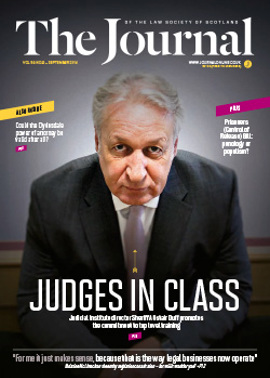From the Brussels office
Split emerges on money laundering trust rules
A difference has emerged between the EU Parliament and Council in relation to the proposed Fourth Directive on Money Laundering and its effect on trusts. It relates to the proposed requirement for member states to maintain publicly available ultimate beneficial ownership (UBO) registers for both corporate entities and trusts, which is opposed by
the UK Law Societies as having unfortunate unintended consequences for citizens’ privacy in all member states, particularly in the UK.
Publicly available UBO registers for trusts remain mandatory under the European Parliament amendments to the proposed directive. However, there is no such requirement in the Council’s recently adopted position. The positions of these institutions are therefore far removed at present. This will make the position of the Commission crucial on entering trialogue negotiations. The Law Societies have drafted a letter to Commissioner Michel Barnier on the matter, encouraging the Commission to reject public UBO registers for trusts, as it had in its initial draft of the text. The negotiations begin in the autumn.
CJEU upholds lawyers’ freedom to move
In a judgment of 17 July 2014, the Court of Justice held that a national travelling to another country to obtain the qualification of lawyer before returning home to have that qualification registered, does not constitute an abuse of the right of establishment, as provided for in the Lawyers Directive.
It concerned two Italians who obtained degrees, in Italy and then Spain, and were admitted as lawyers by the Spanish bar. They returned to Italy and applied for registration as established European lawyers. The Italian Bar Council said they circumvented Italian regulations on access to the profession, and sought guidance from the CJEU on the scope to refuse access under the directive for abuse of the right.
The court stated that, while EU law may not be relied upon for abusive or fraudulent ends, in a single market the right of citizens to decide where to gain their title and where to practise law is an exercise of fundamental freedoms guaranteed in the Treaties. The manner in which the two Italians had acquired their title was in fact one of the objectives of the directive and did not constitute an abuse of the right of establishment.
In this issue
- Keep the job going?
- Asbestos and the state of knowledge
- Damned lies and bogus statistics
- Sorry seems to be the hardest word
- With a fair RWIND
- Planning land reform: the land of Scotland and the common good
- Reading for pleasure
- Opinion: Joanne Gosney
- Book reviews
- Profile
- President's column
- Roadshows roll out
- People on the move
- Outcomes, or own goals?
- Power and authority
- Licensed to reoffend?
- Raising the bar for the bench
- Title insurance – under the bonnet
- Working for Uncle Sam
- Family failings
- Shopping with protection
- Private sector progress at public sector expense?
- Rent review: the storm before the calm
- Doping: raising the stakes
- New financial services arm for ILG
- Under starter's orders
- Childcare: the benefits
- Law reform roundup
- Follow the leader
- Five years from when?
- Ask Ash
- Take the money?
- From the Brussels office
- Beware the bank calls
- Mentoring – why?






